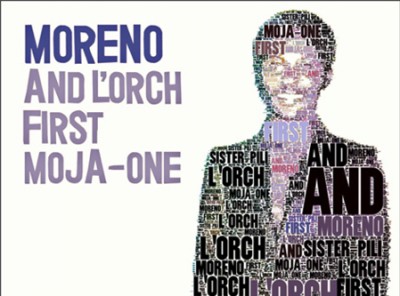Blog June 23, 2014
More East African Brilliance From Moreno and L'Orchestra First Moja-One
It's sad that, in the current wave of Western interest in the classic dance-band sounds of Africa, the Congolese rumba that dominated much of the continent for decades has received fairly short shrift. In comparison with the more accessibly funky sounds of West African forms like highlife and Afrobeat, rumba and soukous have remained relatively unexplored, unable to gain DJ cachet or a live revival.
This really shouldn't come as much of a surprise. Complexly cosmopolitan, and functioning under a long-form tension and release system quite different from the musical cycles that define so much of Western music, rumba musicians never really had the international success they deserved--that is, with the obvious and major exception of the French-speaking world centered around Paris. Soukous stars like Papa Wemba almost ran the city in the late '80s/early '90s.)
All of this goes to say that Sterns' archival release of Vol. 2: More Pili by Moreno and L'Orch Moja-One (a digital-only follow-up to 2012's equally brilliant Sister Pili) is a welcome chance to jump into this astounding music. Moreno Batamba and much of his band were originally from the eastern regions of the Congo (then Zaire), but were drawn to the multinational scene in East Africa (specifically Kenya and Tanzania) by the relative political stability, high-quality studios, and abundance of musical opportunity to be found there. While live music was booming at the time, L'Orch Moja-One rather unusually came together solely in the studio, pulling from the top tier of Kenyan musicians to assemble a truly stellar band.
And the results were nothing less than spectacular. This is rumba at its best--intricate, fleet-footed, and laced with the kind of dynamic interplay that most bands would kill for. Guitarists flash their skills to the sides of the spotlight, while harmonized call-and-response vocals provide an emotive sweetness that clearly mark these tracks as songs rather than mere instrumental workouts. Yet despite the songcraft behind the album, the music is perfectly designed for the dance floor. The tracks, many of which push the nine-minute mark, tend to employ the classic rumba energy arc, gradually building intensity into the sebene, a solo-heavy section where all hell breaks loose, the guitarists exploding into a bright cloud of intertwined licks while the drummer--who you realize has been holding back the entire time--really starts to push. It's magnificent and euphoria inducing, the kind of thing worth hearing again and again. So if you haven't experienced this music before, now is the time. And if you already know Franco, Tabu Ley, Zaiko and the rest of the crew, we encourage you to take a spin through this record. You won't be disappointed.
Give it a listen here:









